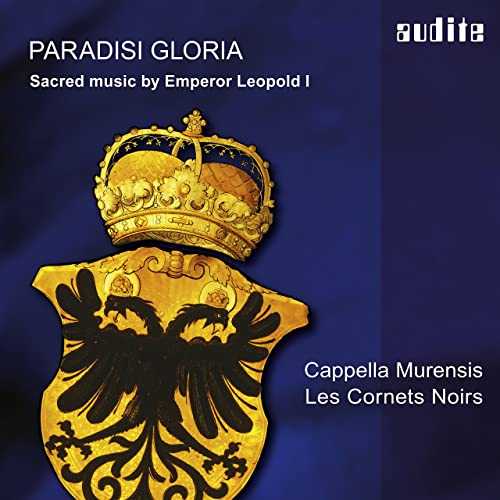
Composer: Leopold I
Performer: Ulrike Hofbauer, Lisandro Abadie, Alex Potter, Hans-Jörg Mammel, Monika Mauch, Cappella Murensis, Les Cornets Noirs
Conductor: Johannes Strobl
Format: FLAC (tracks)
Label: Audite
Release: 2016
Size: 727 MB
Recovery: +3%
Scan: yes
Stabat Mater, WV 47
01. Sonata
02. Stabat mater dolorosa
03. Quis not potest contristari
04. Pro peccati suae gentis
05. Tui nati vulnerati
06. Fac me vere tecum flere
07. Inflammatus et accensus
08. Fac me cruce custodiri
09. Quando corpus morietur
Motetto de Septem Doloribus Beatae Mariae Virginis, W 40, “Vertatur in luctum cythara nostra”
10. Sonata
11. Vertatur in luctum cythara nostra
12. Lachrymantem et dolentem
13. Acutissimi dolores
14. Ritornello
15. Afflicitissima tristatur
16. Fontes lachrymarum
17. Dicite, filiae Sion
18. Fons signatus
19. Maerores igitur Mariae
Missa pro defunctis, W 11
20. Sonata
21. Requiem aeternam
22. Te decet hymnus
23. Requiem aeternam
24. Kyrie
25. Christe
26. Kyrie
27. Sonata
28. Sanctus
29. Pleni sunt caeli
30. Hosanna
31. Benedictus
32. Hosanna
33. Agnus Dei
34. Sonata
35. Lux aeterna
36. Cum sanctis tuis
37. Requiem aeternam
38. Cum sanctis tuis
3 Lessons (3 Lectiones), I. Nocturni
39. Sonata
40. Lectio prima: Parce mihi, Domine
41. Responsorium: Credo, credo
42. Sonata
43. Lectio secunda: Taedet anima mea
44. Responsorium: Qui Lazarum resuscitasti
45. Sonata
46. Lectio tertia: Manus tuae, Domine
47. Responsorium: Domine, quando veneris
A well-regarded composer in his own right, Leopold I transformed the Viennese court into a centre of European culture.
The beautiful settings he wrote for the burials of his first two wives, as well as his music for the Feast of the Seven Sorrows of the Blessed Virgin Mary, are testament to the Emperor’s musical talent.
Born in 1641 in Vienna as the second son of Emperor Ferdinand II, Leopold I was initially destined for a theological career and hence received a suitable education to this end. He was nominated as successor to his father, who had died the previous year, as Holy Roman Emperor in 1658 in Frankfurt only after the death of his elder brother, Ferdinand. He reigned until his death in 1705 as a controversial ruler, because he was indecisive and less interested in politics than in music, feast days, religion, and hunting. He inherited a gift for music from his father and was inculcated with the love of music by him; Ferdinand III had prepared the way as a poet of Italian texts and composer. Leopold devoted himself to music and to the musicians of his Hofkapelle (Court Chapel) with even greater commitment. As a child he was taught the harpsichord by the court organist Marcus Ebner and probably received lessons in composition from the Hofkapellmeister (Director of Music at the Court Chapel) Antonio Bertali.
Sixty-nine of Leopold I’s numerous autonomous compositions have survived. Most of them are smaller works of church music, but we know of at least an ordinary mass and a requiem, ten oratorios and sepolcri (oratorios before the Holy Sepulchre), an Italian opera and an act of a further one, two serenatas, two Spanish intermezzos and six theatre works in addition nevertheless. We also know of one further opera of his composing, but only one aria from it has survived.
Beyond this, though, the emperor contributed individual arias or scenes to most of the over 200 operas that were performed during his reign.
This CD gives an overview of the liturgical compositions that he penned. The idea that Leopold composed sad melodies particularly aptly, as a diplomat reported, is confirmed by the compositions recorded here, the texts of which all concern death – either that of Jesus Christ or the human one.